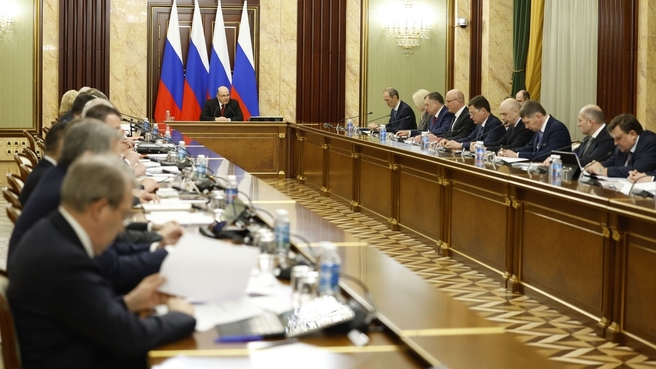Agenda: automatic renewal of permits in 2023; expanding Russian social support measures to the new territories; pensions, mandatory social insurance and unemployment benefits in the new regions; and adopting a uniform approach to scientific assessment.
Mikhail Mishustin’s opening remarks:
Good afternoon, colleagues.
Enterprises’ permits in certain areas will remain effective until the end of the year, including in transport, the environment, industrial safety, communications, radio and television broadcasting, and the marketing of veterinary medicines and feed additives.
This system was used last year, and it was seamlessly extended on 1 January. The organisations do not have to take any additional steps, because government agencies will make the necessary amendments in the relevant registers, information systems and databases. No fees or levies are stipulated for this. The necessary licences will also be issued free of charge.
The agencies that are authorised to issue these documents will simplify their issuance by reducing the processing time and the list of information to be submitted. Overall, we are talking about more than 100 types of permits.
This procedure will also be effective in the Donetsk and Lugansk people’s republics and the Zaporozhye and Kherson regions.
We hope that this will allow businesspeople to devote more time to developing their businesses, implementing their ideas and finding their place in the market vacated by their foreign competitors.
Let us discuss today’s agenda.
First, I would like to note that the President has instructed us to take a system-wide and comprehensive approach towards the integration of the new territories into Russia’s common socioeconomic space.
Today, we will review a number of items aiming to introduce a national social security system there, so that local residents would be able to use the same state support measures as those all over Russia and to obtain monthly payments and the relevant social service packages.
The Government has drafted a bill stipulating a special procedure for calculating the average subsistence minimum. The figure is used to calculate assistance volumes, including the standard benefit for needy families that was introduced nationwide on 1 January as per the President’s initiative.
Pregnant women, as well as families raising children under 17, will obtain this benefit in these four Russian regions.
Nationwide social security measures will also apply to people with health impairments and other benefit seekers.
From 2024, it will be possible to sign social contracts. All these social support options help people cope with financial difficulties, and they should be provided in full and on time.
And one more thing. We need to inform people in the Donetsk and Lugansk people’s republics and the Zaporozhye and Kherson regions about legislative innovations. These issues are very sensitive. People should realise what assistance they can obtain as citizens of the Russian Federation and how they should go about getting it all.
Pensions in the new regions are covered by another important bill.
Under this draft law, pensions for the residents of the new regions will be awarded based on their applications starting March 1 and according to Russian standards.
Many people are now unable to confirm their incomes or length of service with documents from employers or the federal or municipal authorities. Dedicated interdepartmental commissions will help resolve these issues. A regulatory section to that effect has been approved. The commissions will make sure individual rights are protected.
Just like in the rest of the country, pensions and supplementary benefits will be adjusted to inflation. Quality of life directly depends on the timely fulfillment of these obligations, which must be carried out no matter what in every region of the Russian Federation.
Another draft law is aimed at including the new Russian regions in the compulsory social insurance system, which guarantees paid sick leave to their residents.
The document also defines rules for granting, according to national standards, maternity benefits, as well as childcare benefits for children under 18 months inclusive, which was not previously paid in the Donetsk and Lugansk people’s republics or the Zaporozhye and Kherson regions.
Their residents will also be eligible to occupational accident or disease payouts in accordance with our legislation. If such payments were awarded to a person in a larger amount earlier, the amount will remain unchanged until March 1.
On to matters of employment in the new territories.
Under Russian law, people who have lost their jobs are paid unemployment benefits. The Government will set aside over 1 billion roubles this year to provide this kind of support in the new regions and republics. We must make sure that everyone who needs these payments gets them. To this end, we will allocate additional funds as necessary.
I would like Ms Golikova and Mr Kotyakov to keep an eye on how the social protection system is being introduced in the new territories based on the national standards. You must be on top of the situation.
Next, a law has been drafted at the President’s instruction to enshrine the concept of scientific expert analysis.
Single approaches to conducting this are not legally regulated. The President brought our attention to the importance of making appropriate adjustments at a meeting of the Council for Science and Education. He also emphasised the importance of ensuring general planning and implementing research projects. We need uniform principles underlying evaluation in these matters. We need to define them.
All phases of scientific and technical expert analysis will now be fully regulated. The underlying criteria and mechanisms, as well as lists for research items, and requirements for specialists, will be determined by the Government. The key role in organising and conducting the analysis will be assigned to the Russian Academy of Sciences.
Importantly, these legislative measures should contribute to creating innovative technology and breakthrough developments to move the economy and the social sphere forward and to achieve the country’s technological sovereignty in general.









